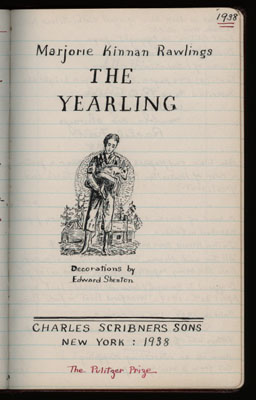Collecting Journals: Volume XVI, 1936-1940
Volume XVI opens with some interesting correspondence to Lillian from Randolph G. Adams, the Director of Clements Library at the University of Michigan. Adams wrote to Lillian upon hearing of her reaction to his essay on “Librarians as enemies of books.” After reassuring her upon the value of her collection, based in “the intrinsic literary merit of the books themselves,” “the investment made in them,” and the collection’s “synthesis,” Adams appears to court Lillian’s collection for the University of Michigan’s library. He says, “This is just a message to give you hope and encouragement in your work, and to assure you that there are permanent repositories where collection like yours will be tenderly cared for and properly appreciated.” While Lillian clearly appreciated this 1937 letter, it did not deter her from giving her collection to the University of Virginia, rather than the University of Michigan.
Among the longer entries for this volume is the one for Margaret Mitchell’s Gone with the Wind. Lillian clearly enjoyed the novel, writing, “now here is a Best Seller!!” and quoting reviews and an interview with Mitchell, along with a transcription of Mitchell’s response to a letter from Lillian’s husband, Robert Coleman Taylor. Of this response Lillian says, “Bob wrote to her questioning her statement that Longstreet’s troops rushed through Atlanta. She most civilly answered his letter, and I quote her answer which in its envelope, I have placed in my book.”
In her entry for The Patriot, Pearl S. Buck’s 1939 novel, Lillian’s personal assessment of the novel goes beyond her quote of Carl van Doren’s assertion that it is “another excellent Chinese novel,” adding, “It is more than that—” For Christopher Morley’s Kitty Foyle, she leaves such judgments to posterity: “A book so read an discussed that it must be included in my collection. It will also help the student to gauge public taste in our time. For months it headed the Best Seller lists.” Native Son, by Richard Wright, is another book that Lillian notes as “much read and discussed,” but here she refuses to take part such discussions, stating, “Always called a strong book, but most unpleasant. I was told, ‘You must read it,’ but I never did, so I cannot criticize it. Undoubtedly a book to be recognized and weighed.” Such negotiations of the literature of her day are insightful markers of popular and critical literary opinion in the 1940s.

